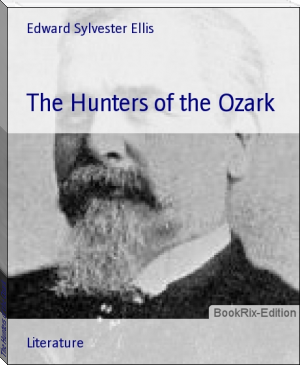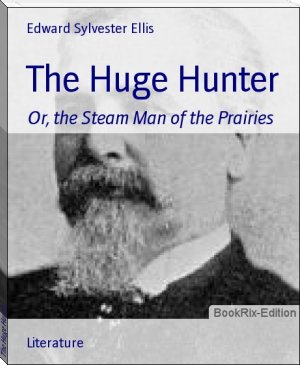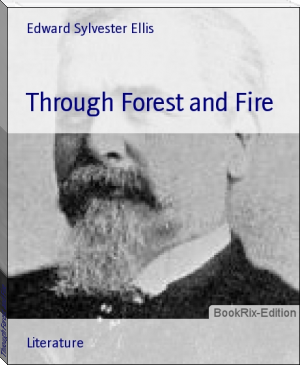The Hunters of the Ozark - Edward Sylvester Ellis (children's ebooks online .txt) 📗

- Author: Edward Sylvester Ellis
Book online «The Hunters of the Ozark - Edward Sylvester Ellis (children's ebooks online .txt) 📗». Author Edward Sylvester Ellis
picked up his own rifle from where it leaned against the tree and handed it to him, while Wau-ko-mia-tan stood at the other end of the group, until the warrior, his ugly face glowing like that of a demon, stepped to his side. Then the two, without a word or motion like a farewell, turned away and vanished in the gloom of the wood.
They had not taken a dozen steps, when Deerfoot glided from behind the tree and passed after them, as if he were the shadow thrown out by the light of the camp-fire. The expression on his face was such as would have hushed Fred Linden and Terry Clark to awed silence could they have seen it.
The two Winnebagos did not come directly back to the trail, but fell into it at almost the precise point where Deerfoot had led his two friends. They stopped a few minutes and talked in their low, guttural tones, none of which was understood by the Shawanoe, who listened with the closest attention.
There was considerable distance at that time between the warriors and Fred and Terry, who had set out with the ambition to keep up their traveling through the entire night. The Winnebagos did not wait long, when they moved on at their usual pace.
Less than a mile from the camp, the warriors again came to a halt and as before talked in a low voice. The point was where the wood was more open, so that the moonlight which found its way among the limbs above showed their forms quite plainly. More than that, enough of their words were audible to enable the listening Shawanoe, who had crept dangerously near, to catch their meaning.
The Winnebagos turned off at almost a right angle and left the trail behind them. The ground was broken, but they had not gone far, when it became evident that they were following another path, though it was so faintly marked that no eye except that of an American Indian could have discovered it in such an uncertain light.
As they advanced, the surface became not only rougher, but the grade which they ascended was so steep that it would have been tiresome to an ordinary traveler.
Suddenly Deerfoot himself wheeled aside from the indistinct path to which the Winnebagos clung and passed lightly and with great speed through the wood where no one had walked before. So swiftly did he make his way, that, though he crossed a deep ravine and went a considerable distance, it was less than live minutes before he came back to the shadowy trail.
Instead of keeping along this path, in the same direction as that of his enemies, he turned about and advanced to meet the red men who had dared to come that way. He walked with his usual noiseless step, and stopped on reaching the edge of the ravine over which he had leaped when it crossed his path only a few minutes before.
This gully was more than twenty feet in depth, and about half as wide. The trail led to the edge on one side, continuing on the margin directly opposite, so that any one who wished to keep to it was perforce compelled to leap the chasm--a slight task for any Indian, though it would have been easy to make a bridge by means of a fallen tree.
The moon was now directly overhead, so that a flood of light fell into the craggy ravine, lighting up the gray rocks and bowlders, the prostrate trees that had fallen from the sides, the vegetation along the slopes and the mossy grass that had been watered by the torrents when they roared through. The trees grew rank and close to the edge at the top--so close that some of them had slidden off and fallen part way below, carrying the gravel, sand and earth with the prong-like roots part way to the bottom.
So faint was the mark of the trail opposite that even with the help of the moonbeams, it took an eye as keen as that of Deerfoot to tell where his enemies would appear. But he coolly awaited them, though his calmness was the fearful calm of a fury such as even he rarely knew.
CHAPTER XXIV.
THE DEFIANCE.
The expression of the face of Deerfoot was terrible. The whole fury of his nature was at white heat. He knew that the two Winnebagos had set out to commit a fearful crime, and it was his work to stay their hands. There was but the single way in which they could be stayed.
The young Shawanoe kept back a couple of paces from the edge of the ravine, where the shadow of the stunted trees above would hide him from his foes when they should come in sight. He held his gun pointed and cocked. Though his passion had the glow of the furnace, he was as calm as death.
He had not long to wait. By and by a low guttural exclamation struck his ear, and his hearing, strung to a marvelously fine point, caught the sound of the soft moccasins on the hard earth. Less than a minute later the form of the Wolf came into the moonlight, as a bather emerges from the side of a lake. Seeing the open ravine at his feet, he stopped, and instantly his companion, Wau-ko-mia-tan, appeared at his side.
They quickly saw that the leap was an easy one.
"Wau-ko-mia-tan will leap across," said that warrior, "then the Wolf will follow; let us lose no time, for the Shawanoe may be gone."
The speaker recoiled a single pace and gathered his muscles for the leap. He took one quick step and made a terrific bound upward and outward, straight for the rocky brink whereon Deerfoot the Shawanoe instantly stepped into the moonlight.
The Winnebago was in mid-air, crouching like a leaper, with his legs gathered under him and his arms at his side, when there was a fierce whiz, like the rush of an eagle's wing, something flashed in the moonlight, and the tomahawk, driven by a lightning-like sweep of the Shawanoe's arm, was buried in the chest of the Winnebago as it would have sunk in so much sodden earth.
An ear-splitting screech burst from the throat of the smitten warrior, who struck the edge of the ravine like a bundle of rags flung thither, and then tumbled to the bottom as dead as the jagged rock on which he lay.
The Wolf stood transfixed, unable to understand what had taken place. Then he saw the figure of the youthful warrior on the other side and heard his voice.
"Rattlesnake of a Winnebago! Die the death of the rattlesnake!"
The wretch was given no time to protest again, for the words were yet in the mouth of Deerfoot when the flash of his rifle lit up the partial gloom, and the crack of the weapon mingled with the death shriek of the redskin, who slumped end over end down the ravine and lay beside the body of Wau-ko-mia-tan as dead as he.
"Thus shall die all that seek to follow your footsteps," muttered the Shawanoe, who, standing where he stood when he slew both, proceeded to reload his rifle with as much coolness as though he had just fired at a target on a tree.
This finished, he let himself over the edge of the ravine, holding fast a moment by one hand, and then letting go, dropped lightly beside the two bodies that lay below. His face showed no excitement now, and he moved with his usual care and deliberation. Drawing the hunting-knife which he had taken from the Wolf, he partly bent over, but straightened up again, saying to himself:
"Deerfoot is a Christian Indian and can not scalp a foe though as base as they."
Picking up each rifle (that of Wau-ko-mia-tan being still clutched by his nerveless fingers while the Wolf's had fallen from his grasp), he deliberately broke the locks of each by striking them on the stones. He then recovered his own tomahawk, and carried off the useless weapons with him.
He passed down the ravine until he reached a point where the sides were not so high. There he clambered out, still keeping the two broken guns. He had reached high ground on the side from which had come the Winnebagos, and he walked grimly forward, until in a brief while he reached the main trail over which he and the boys had passed a brief while before.
He turned toward the left, which led him in the direction of the camp of the Ozarks as well as toward the camp of Black Bear and his Winnebagos. He took longer steps than usual, but did not trot or run.
When he once more caught the glimmer of the camp-fire among the trees, he slackened his pace and drew nigh with the caution that had become a second nature to him. He quickly saw that the Winnebagos had disposed of themselves for the night. The fire was burning as brightly as ever, because of the attention it received from the two warriors who were standing on guard.
The party were in a portion of the country where they knew there was scarcely a possibility of their being molested by any one; but the American Indian loves nothing like laziness and war; and, treacherous by nature himself, he expects treachery at all times in others. And so, although they knew of no enemies within miles of them (unless it was Deerfoot, whom they did not fear) they had two vigilant sentinels on duty. The rest were stretched out on their blankets with their feet turned toward the blaze, sleeping like so many tired animals.
At the moment of Deerfoot's approach, the Winnebagos on guard were standing some twenty feet apart, with the fire burning between them. Each held a loaded gun in hand and cast his keen glance hither and thither in the gloom, eyes and ears alert for the first suspicious sight or sound.
The sentinel nearer Deerfoot was Black Bear himself. The chieftain evidently believed that the best way to instruct his warriors in their duty was to set the example. His attitude showed that something had arrested his attention. Deerfoot knew that the sound had been made by his moccasin, for he purposely rustled the leaves.
Black Bear looked intently off in the gloom, but seeing nothing, turned his head and told the other guard to fling more wood upon the fire. He obeyed, and the circle of light quickly extended out among the trees.
It would have been an easy matter for the Shawanoe to slay both, but he had no thought of doing so. That would have been killing without justification.
The Winnebago chieftain was gazing intently into the night, when from behind a tree, no more than a dozen steps distant, softly stepped the young Shawanoe.
"Listen, Black Bear," said he, "to the words of Deerfoot the Shawanoe. Twice did he spare the life of the Wolf and the Wolf thanked him, but he went out a third time to take his life; he was a rattlesnake, but he had not the courage of the rattlesnake, for he took with him Wau-ko-mia-tan, whose heart was that of a rattlesnake also; they bent their steps where none but Deerfoot has the right to go; therefore Deerfoot killed them and took away their guns. _There they are!_"
In the same minute that Deerfoot began speaking, the second sentinel stepped forward and took his place beside his chief. That both were amazed need not be said. Each stood with the muzzle
They had not taken a dozen steps, when Deerfoot glided from behind the tree and passed after them, as if he were the shadow thrown out by the light of the camp-fire. The expression on his face was such as would have hushed Fred Linden and Terry Clark to awed silence could they have seen it.
The two Winnebagos did not come directly back to the trail, but fell into it at almost the precise point where Deerfoot had led his two friends. They stopped a few minutes and talked in their low, guttural tones, none of which was understood by the Shawanoe, who listened with the closest attention.
There was considerable distance at that time between the warriors and Fred and Terry, who had set out with the ambition to keep up their traveling through the entire night. The Winnebagos did not wait long, when they moved on at their usual pace.
Less than a mile from the camp, the warriors again came to a halt and as before talked in a low voice. The point was where the wood was more open, so that the moonlight which found its way among the limbs above showed their forms quite plainly. More than that, enough of their words were audible to enable the listening Shawanoe, who had crept dangerously near, to catch their meaning.
The Winnebagos turned off at almost a right angle and left the trail behind them. The ground was broken, but they had not gone far, when it became evident that they were following another path, though it was so faintly marked that no eye except that of an American Indian could have discovered it in such an uncertain light.
As they advanced, the surface became not only rougher, but the grade which they ascended was so steep that it would have been tiresome to an ordinary traveler.
Suddenly Deerfoot himself wheeled aside from the indistinct path to which the Winnebagos clung and passed lightly and with great speed through the wood where no one had walked before. So swiftly did he make his way, that, though he crossed a deep ravine and went a considerable distance, it was less than live minutes before he came back to the shadowy trail.
Instead of keeping along this path, in the same direction as that of his enemies, he turned about and advanced to meet the red men who had dared to come that way. He walked with his usual noiseless step, and stopped on reaching the edge of the ravine over which he had leaped when it crossed his path only a few minutes before.
This gully was more than twenty feet in depth, and about half as wide. The trail led to the edge on one side, continuing on the margin directly opposite, so that any one who wished to keep to it was perforce compelled to leap the chasm--a slight task for any Indian, though it would have been easy to make a bridge by means of a fallen tree.
The moon was now directly overhead, so that a flood of light fell into the craggy ravine, lighting up the gray rocks and bowlders, the prostrate trees that had fallen from the sides, the vegetation along the slopes and the mossy grass that had been watered by the torrents when they roared through. The trees grew rank and close to the edge at the top--so close that some of them had slidden off and fallen part way below, carrying the gravel, sand and earth with the prong-like roots part way to the bottom.
So faint was the mark of the trail opposite that even with the help of the moonbeams, it took an eye as keen as that of Deerfoot to tell where his enemies would appear. But he coolly awaited them, though his calmness was the fearful calm of a fury such as even he rarely knew.
CHAPTER XXIV.
THE DEFIANCE.
The expression of the face of Deerfoot was terrible. The whole fury of his nature was at white heat. He knew that the two Winnebagos had set out to commit a fearful crime, and it was his work to stay their hands. There was but the single way in which they could be stayed.
The young Shawanoe kept back a couple of paces from the edge of the ravine, where the shadow of the stunted trees above would hide him from his foes when they should come in sight. He held his gun pointed and cocked. Though his passion had the glow of the furnace, he was as calm as death.
He had not long to wait. By and by a low guttural exclamation struck his ear, and his hearing, strung to a marvelously fine point, caught the sound of the soft moccasins on the hard earth. Less than a minute later the form of the Wolf came into the moonlight, as a bather emerges from the side of a lake. Seeing the open ravine at his feet, he stopped, and instantly his companion, Wau-ko-mia-tan, appeared at his side.
They quickly saw that the leap was an easy one.
"Wau-ko-mia-tan will leap across," said that warrior, "then the Wolf will follow; let us lose no time, for the Shawanoe may be gone."
The speaker recoiled a single pace and gathered his muscles for the leap. He took one quick step and made a terrific bound upward and outward, straight for the rocky brink whereon Deerfoot the Shawanoe instantly stepped into the moonlight.
The Winnebago was in mid-air, crouching like a leaper, with his legs gathered under him and his arms at his side, when there was a fierce whiz, like the rush of an eagle's wing, something flashed in the moonlight, and the tomahawk, driven by a lightning-like sweep of the Shawanoe's arm, was buried in the chest of the Winnebago as it would have sunk in so much sodden earth.
An ear-splitting screech burst from the throat of the smitten warrior, who struck the edge of the ravine like a bundle of rags flung thither, and then tumbled to the bottom as dead as the jagged rock on which he lay.
The Wolf stood transfixed, unable to understand what had taken place. Then he saw the figure of the youthful warrior on the other side and heard his voice.
"Rattlesnake of a Winnebago! Die the death of the rattlesnake!"
The wretch was given no time to protest again, for the words were yet in the mouth of Deerfoot when the flash of his rifle lit up the partial gloom, and the crack of the weapon mingled with the death shriek of the redskin, who slumped end over end down the ravine and lay beside the body of Wau-ko-mia-tan as dead as he.
"Thus shall die all that seek to follow your footsteps," muttered the Shawanoe, who, standing where he stood when he slew both, proceeded to reload his rifle with as much coolness as though he had just fired at a target on a tree.
This finished, he let himself over the edge of the ravine, holding fast a moment by one hand, and then letting go, dropped lightly beside the two bodies that lay below. His face showed no excitement now, and he moved with his usual care and deliberation. Drawing the hunting-knife which he had taken from the Wolf, he partly bent over, but straightened up again, saying to himself:
"Deerfoot is a Christian Indian and can not scalp a foe though as base as they."
Picking up each rifle (that of Wau-ko-mia-tan being still clutched by his nerveless fingers while the Wolf's had fallen from his grasp), he deliberately broke the locks of each by striking them on the stones. He then recovered his own tomahawk, and carried off the useless weapons with him.
He passed down the ravine until he reached a point where the sides were not so high. There he clambered out, still keeping the two broken guns. He had reached high ground on the side from which had come the Winnebagos, and he walked grimly forward, until in a brief while he reached the main trail over which he and the boys had passed a brief while before.
He turned toward the left, which led him in the direction of the camp of the Ozarks as well as toward the camp of Black Bear and his Winnebagos. He took longer steps than usual, but did not trot or run.
When he once more caught the glimmer of the camp-fire among the trees, he slackened his pace and drew nigh with the caution that had become a second nature to him. He quickly saw that the Winnebagos had disposed of themselves for the night. The fire was burning as brightly as ever, because of the attention it received from the two warriors who were standing on guard.
The party were in a portion of the country where they knew there was scarcely a possibility of their being molested by any one; but the American Indian loves nothing like laziness and war; and, treacherous by nature himself, he expects treachery at all times in others. And so, although they knew of no enemies within miles of them (unless it was Deerfoot, whom they did not fear) they had two vigilant sentinels on duty. The rest were stretched out on their blankets with their feet turned toward the blaze, sleeping like so many tired animals.
At the moment of Deerfoot's approach, the Winnebagos on guard were standing some twenty feet apart, with the fire burning between them. Each held a loaded gun in hand and cast his keen glance hither and thither in the gloom, eyes and ears alert for the first suspicious sight or sound.
The sentinel nearer Deerfoot was Black Bear himself. The chieftain evidently believed that the best way to instruct his warriors in their duty was to set the example. His attitude showed that something had arrested his attention. Deerfoot knew that the sound had been made by his moccasin, for he purposely rustled the leaves.
Black Bear looked intently off in the gloom, but seeing nothing, turned his head and told the other guard to fling more wood upon the fire. He obeyed, and the circle of light quickly extended out among the trees.
It would have been an easy matter for the Shawanoe to slay both, but he had no thought of doing so. That would have been killing without justification.
The Winnebago chieftain was gazing intently into the night, when from behind a tree, no more than a dozen steps distant, softly stepped the young Shawanoe.
"Listen, Black Bear," said he, "to the words of Deerfoot the Shawanoe. Twice did he spare the life of the Wolf and the Wolf thanked him, but he went out a third time to take his life; he was a rattlesnake, but he had not the courage of the rattlesnake, for he took with him Wau-ko-mia-tan, whose heart was that of a rattlesnake also; they bent their steps where none but Deerfoot has the right to go; therefore Deerfoot killed them and took away their guns. _There they are!_"
In the same minute that Deerfoot began speaking, the second sentinel stepped forward and took his place beside his chief. That both were amazed need not be said. Each stood with the muzzle
Free e-book «The Hunters of the Ozark - Edward Sylvester Ellis (children's ebooks online .txt) 📗» - read online now
Similar e-books:





Comments (0)